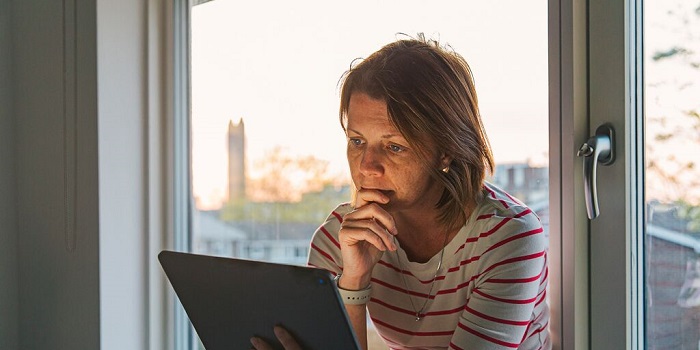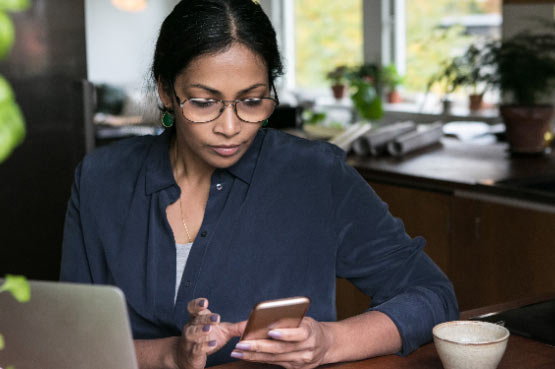Coping with anxiety about world events
There’s a lot going on in the world right now such as natural disasters, human suffering, disease outbreaks, injustice and unrest. And seeing these events happen can affect how we feel, even if they’re not happening directly to us.
Here I look at how to support your own mental health during times of worry and uncertainty about world events.

How do I stop worrying about world news?
It’s important to stay informed about current events. But today’s constant media coverage can cause worry and make you feel hopeless. If reading or watching the news makes you feel anxious or upset, try to take breaks.
- Check a trusted news source once or twice a day, and then switch off and focus on something else.
- Turn off notifications on your phone.
- Avoid spending a long time scrolling through news or “doomscrolling”.
- Avoid watching the news in the evening if it impacts on your sleep.
Remember, some news sources tend to sensationalise (present things more dramatically) than others. It’s also important to look beyond the headlines to get a balanced and accurate view.
When things are uncertain, all that news sources can do is to talk about the possible outcomes. So, keep informed, but try not to get caught up in ‘what-ifs’.
Focus on things you can control
It’s worth thinking about whether the things that are making you anxious are things you can control. As hard as it can be to accept, no good can come of worrying about things we can’t change. Instead, try to shift your attention to focus on what you can control, and positive changes you can make. Our worry tree may help you to work through this.
In times of crisis, some of the best things you can do may involve helping others in need. That may be through donating money to charity, raising awareness of a cause, or offering practical help if you can.
Managing your feelings
Accept the fact that certain things will make you feel upset or worried. This is only natural when we’re thinking about global events. But try not to catastrophise (assume the worst possible outcome). Empathy can be good, but it’s important that you don’t neglect your own mental wellbeing.
If anxiety is taking over, it can even help to give yourself a fixed ‘worry time’ during the day. If you find yourself starting to worry outside of this period, tell yourself to save it for your ‘worry time’.
Allow yourself to work through your thoughts during the time you’ve allocated. Writing things down or thinking about whether there are any practical changes you can make may help. For every worst-case scenario, remind yourself that there may be a more positive outcome too.
When the time is up, make sure you move on and give yourself another task or activity to do that keeps your mind busy.
Getting involved with community
If you are worried about what’s happening in the world, there’s probably others that feel the same way. So, it might be helpful to connect with others. This could be locally or you might be able to find online groups.
Here are some ways you could engage with your community:
- volunteering
- attending local events or seminars about causes you care about
- joining an online group where like-minded people have regular meet ups
Connecting with others can help you feel less alone in uncertain times.
Looking after yourself
We can’t predict what will happen in the future or how world events will impact us. But letting our worries take over doesn’t help anyone, least of all ourselves. Don’t let worry or stress impact your daily routines and general health. Make an extra effort to eat well, exercise and get enough sleep. Relaxation techniques, such as breathing exercises and mindfulness, can help too.
As with any form of anxiety, it can help to focus on the here and now. Make time to think about other things and to do things you enjoy. This could be going for a walk, doing a hobby or spending time with loved ones. Living ‘in the moment’ like this can help you to enjoy life, even in times of worry and uncertainty.
Getting support
If you are struggling to cope, try to reach out. This could be:
- contacting a friend or family member
- speaking to a GP
- calling a helpline such as Samaritans
If you’re worried about your mental health, our direct access service aims to provide you with the advice, support and treatment you need as quickly as possible. You’ll be able to get mental health advice and support usually without the need for a GP referral. Learn more today.
-
Sources Sources
- Kellerman JK, Hamilton JL, Selby EA, et al. The Mental Health Impact of Daily News Exposure During the COVID-19 Pandemic: Ecological Momentary Assessment Study. JMIR Ment Health. 2022 May 25;9(5):e36966. doi: 10.2196/36966
- Tips to look after your mental health during traumatic world events. Mental Health Foundation. mentalhealth.org.uk, accessed February 2025
About our health information
At Bupa we produce a wealth of free health information for you and your family. This is because we believe that trustworthy information is essential in helping you make better decisions about your health and wellbeing.
Our information has been awarded the PIF TICK for trustworthy health information. It also follows the principles of the The Information Standard.

More mental health and wellbeing articles
Did you find our advice helpful?
We’d love to hear what you think. Our short survey takes just a few minutes to complete and helps us to keep improving our healthy lifestyle articles.
Legal disclaimer
This information was published by Bupa's Health Content Team and is based on reputable sources of medical evidence. It has been reviewed by appropriate medical or clinical professionals and deemed accurate on the date of review. Photos are only for illustrative purposes and do not reflect every presentation of a condition.
Any information about a treatment or procedure is generic, and does not necessarily describe that treatment or procedure as delivered by Bupa or its associated providers.
The information contained on this page and in any third party websites referred to on this page is not intended nor implied to be a substitute for professional medical advice nor is it intended to be for medical diagnosis or treatment. Third party websites are not owned or controlled by Bupa and any individual may be able to access and post messages on them. Bupa is not responsible for the content or availability of these third party websites. We do not accept advertising on this page.







